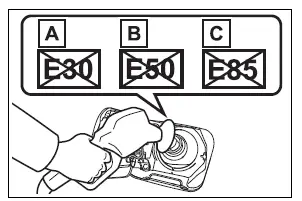Toyota RAV4 (XA50) 2019-2026 Owners Manual: Fuel information
You must only use unleaded gasoline in your vehicle.
Select octane rating 87 (Research Octane Number 91) or higher. Use of unleaded gasoline with an octane rating lower than 87 may result in engine knocking.
Persistent knocking can lead to engine damage.
At minimum, the gasoline you use should meet the specifications of ASTM D4814 in the U.S.A..
‚Ė†Gasoline quality
In very few cases, driveability problems may be caused by the brand of gasoline you are using. If driveability problems persist, try changing the brand of gasoline. If this does not correct the problem, consult your Toyota dealer.
‚Ė†Recommendation of the use of gasoline containing detergent additives
- Toyota recommends the use of gasoline that contains detergent additives to avoid the build-up of engine deposits.
- All gasoline sold in the U.S.A. contains minimum detergent additives to clean and/or keep clean intake systems, per EPA's lowest additives concentration program.
- Toyota strongly recommends the
use of Top Tier Detergent Gasoline.
For more information on Top Tier Detergent Gasoline and a list of marketers, please go to the official website www.toptiergas.com.
‚Ė†Recommendation of the use of low emissions gasoline
Gasolines containing oxygenates such as ethers and ethanol, as well as reformulated gasolines, are available in some cities. These fuels are typically acceptable for use, providing they meet other fuel requirements.
Toyota recommends these fuels, since the formulations allow for reduced vehicle emissions.
‚Ė†Non-recommendation of the use of blended gasoline
- Use only gasoline containing up to
15% ethanol.
DO NOT use any flex-fuel or gasoline that could contain more than 15% ethanol, including from any pump labeled E30 (30% ethanol A), E50 (50% ethanol B), E85 (85% ethanol C) (which are only some examples of fuel containing more than 15% ethanol).

- If you use gasohol in your vehicle, be sure that it has an octane rating no lower than 87.
- Toyota does not recommend the use of gasoline containing methanol.
‚Ė†Non-recommendation of the use of gasoline containing MMT
Some gasoline contains an octane enhancing additive called MMT (Methylcyclopentadienyl Manganese Tricarbonyl).
Toyota does not recommend the use of gasoline that contains MMT.
If fuel containing MMT is used, your emission control system may be adversely affected.
The malfunction indicator lamp on the instrument cluster may come on.
If this happens, contact your Toyota dealer for service.
‚Ė†If your engine knocks
- Consult your Toyota dealer.
- You may occasionally notice light knocking for a short time while accelerating or driving uphill. This is normal and there is no need for concern.
NOTICE
‚Ė†Notice on fuel quality
- Do not use improper fuels. If improper fuels are used, the engine will be damaged.
- Do not use leaded gasoline.
Leaded gasoline can cause damage to your vehicle's three-way catalytic converters causing the emission control system to malfunction.
- Do not use gasohol other than
the type previously stated.
Other gasohol may cause fuel system damage or vehicle performance problems.
- Using unleaded gasoline with
an octane number or rating
lower than the level previously
stated will cause persistent
heavy knocking.
At worst, this will lead to engine damage.
‚Ė†Fuel-related poor driveability
If poor driveability (poor hot starting, vaporization, engine knocking, etc.) is encountered after using a different type of fuel, discontinue the use of that type of fuel.
‚Ė†When refueling with gasohol
Take care not to spill gasohol. It can damage your vehicle's paint.
 Maintenance data (fuel, oil
level, etc.)
Maintenance data (fuel, oil
level, etc.)
Dimensions and weights
*1:Unladen vehicle
*2:Vehicles without 235/55R19 tires
*3:Vehicles with 235/55R19 tires
*4:Vehicles without towing package
*5:Vehicles with towing package
Seating capacity
Veh ...
 Tire information
Tire information
Typical tire symbols
Full-size tire
Compact spare tire
Tire size
DOT and Tire Identification Number (TIN)
Location of treadwear indicators
Tire ply composition and materials
Plies are layers ...
Other materials:
Luggage cover (if
equipped)
‚Ė† Installing the luggage cover
1. Compress the both ends of
the luggage cover and insert
into the recess to install.
2. Pull out the luggage cover
and hook it onto the anchors.
‚Ė† Removing the luggage
cover
1. Release the cover from the
left and right anchors and
allow it to retract.
2. Compre ...
How to proceed with troubleshooting
Hint:
Use these procedures to troubleshoot the sliding roof
system.
*: Use the intelligent tester.
Vehicle brought to workshop
Inspect battery voltage
Standard voltage:
11 to 14 v
If the voltage is below 11 v, recharge or replace the battery
before proceeding.
Inspe ...
Back door lock
Inspection
Inspect back door with motor lock assembly
Apply the battery voltage to the door lock motor and
check the operation of the door lock motor.
Ok
If the result is not as specified, replace the door lock
assembly. ...
